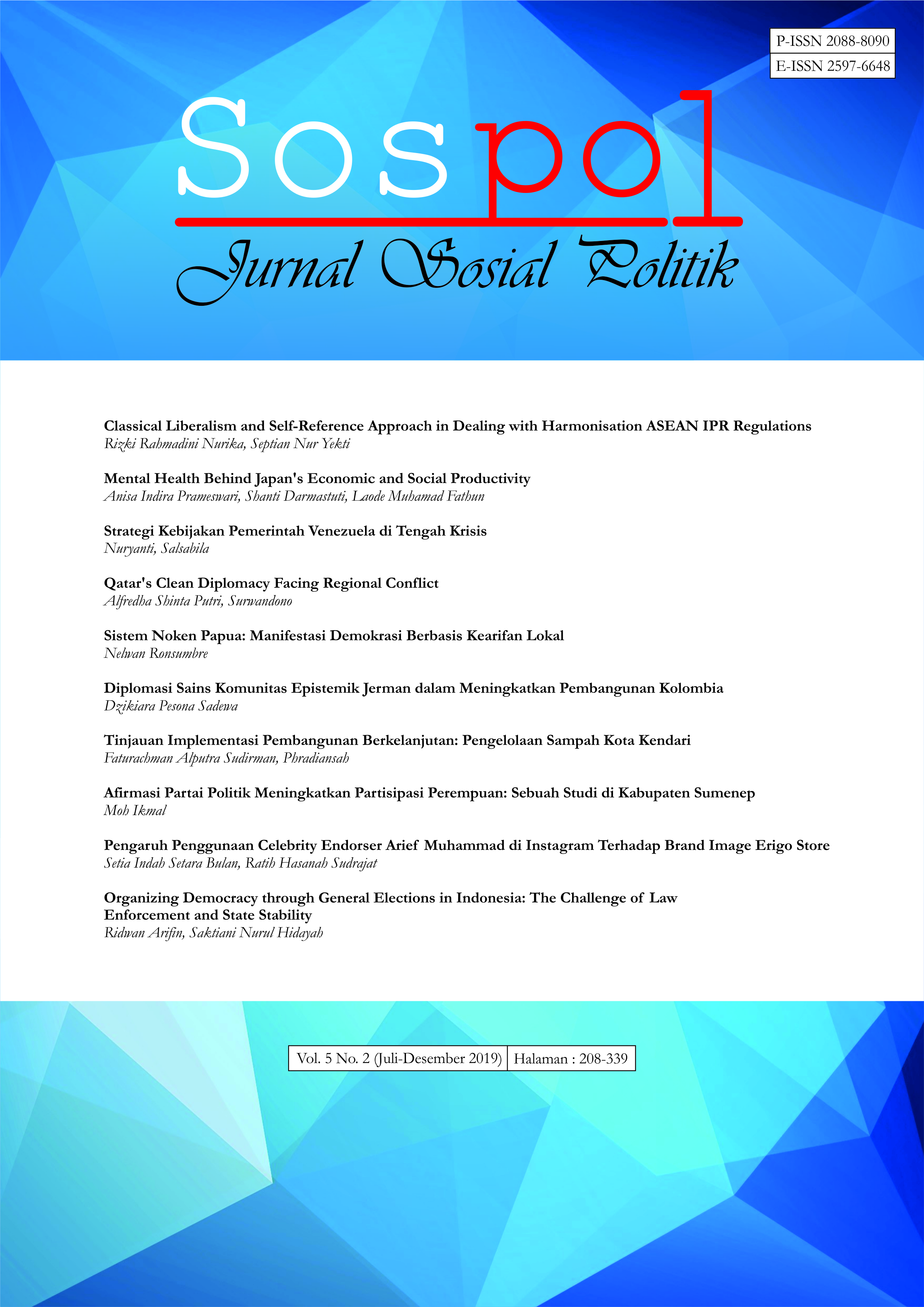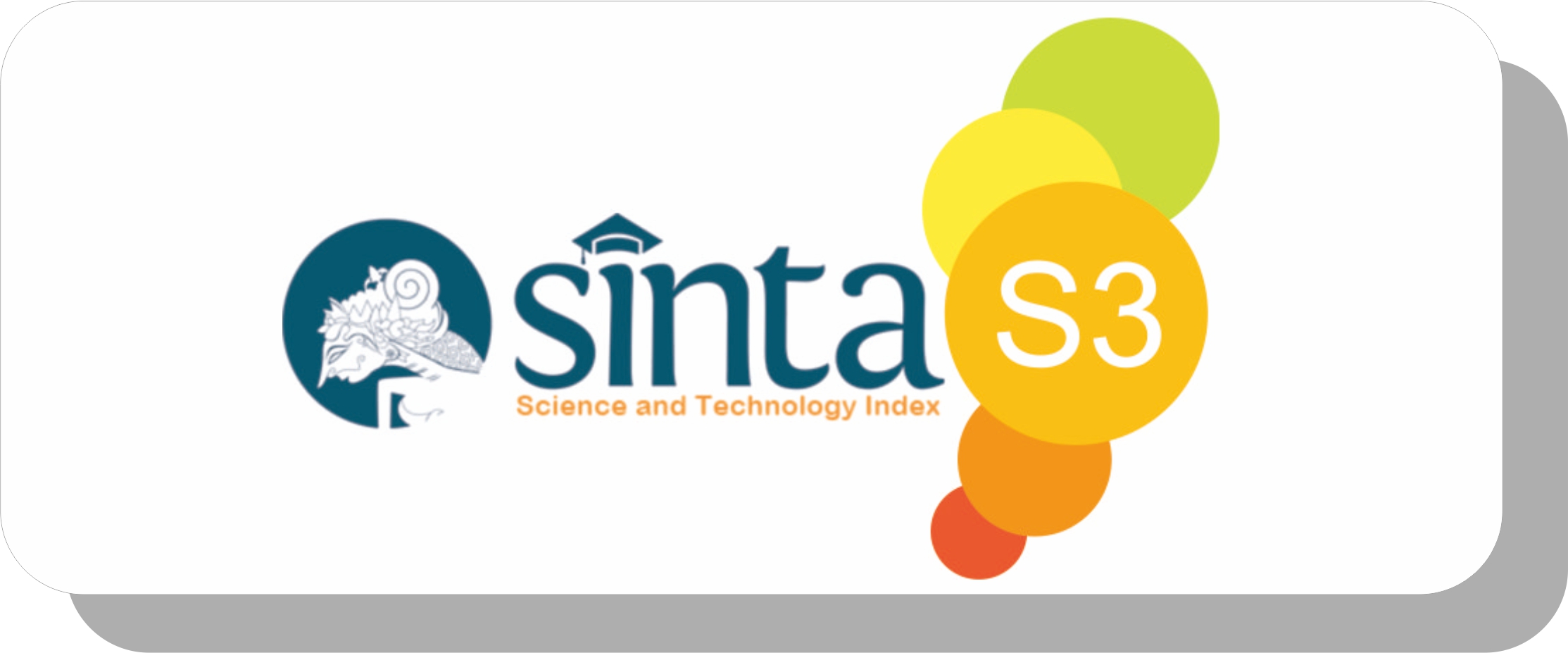Diplomasi Sains Komunitas Epistemik Jerman Dalam Meningkatkan Pembangunan Kolombia
DOI:
https://doi.org/10.22219/sospol.v5i2.7791Keywords:
Colombia, Epistemic Communities, Germany, Science DiplomacyAbstract
This article discusses how the scientific diplomacy efforts undertaken by the German Epistemic Community in promoting Colombian development. The Epistemic Community is the liaison between the two countries in the hope of being able to contribute to a country's policy through science in dealing with various local and global issues and can also contribute to the development of Colombia. By using descriptive qualitative research methods along with the concept of epistemic community and scientific diplomacy, this study produced findings that the Science Diplomacy carried out by the German Epistemic Community in promoting development in Colombia manifested itself in the form of efforts to improve academic collaboration, support the implementation of academic activities within government agencies, and continue recommendations for the development of various aspects of science in the research sector related to development policy.
Downloads
References
Adler, E. (1997). Seizing the Middle Ground: Constructivism in World Politics. . European Journal of International Relations.
Alexander von Humboldt (2018) Instituto de Investigación de Recursos Biológicos
Alexander von Humboldt diakses melalui http://www.humboldt.org. co/en/ institute/about-us/what-do-we-do
Alumni Portal deutschland. (2018). Colombia and Germany consolidate international research partnerships: melalui https://www.alumniportal-deutschland.org/en/science-research/news-from-science/international-research-partnerships-colombia-germany/
Aranzales, B. & Kelly. J. (2017). The role of epistemic communities in science diplomacy : an Analysis of U.S and German foreign policy towards Colombia. Universidad del Rosario Colombia
Bakry. U, S, (2017). Dasar Dasar hubungan Internasional .Jakarta:Pranadamedia Group
Balch, A. (2009). Labour and Epistemic Communities:The Case of ‘Managed Migration’ in the UK. The British Journal of Politics and International Relations, VOL 11, 613–633.
BBC. (2018, Agustus 8) Colombia country profile: Melalui https://www.bbc.com/ news/ world-latin-america-19390026
Cancilleria de Colombia (2018) German diakses melalui https: //www. cancilleria. gov.co/en/ content/germany
Capaz (2018) Capaz Project diakses melalui https://www.instituto-capaz.org/ areas/ projects/
Cemarin (2018) Cemarin Work diakses melalui https://www.cemarin.org/en/our-work/
Cogburn, D. (2005). Partners or Pawns?: The Impact of Elite Decision-Making and Epistemic Communities in Global Information Policy on Developing Countries and Transnational Civil Society. Knowledge, Technology, & Policy.
Cresswell J.(2014).Research Design Qualitative,Quantitative And Mixed,SAGE:London
DAAD (2018) The internationalisation agency diakses melalui https:// www. daad .de/der-daad/ueber-den-daad/ portrait/en/29143-the-internationalisation-agency/
DAAD Colombia (2018) Proyectos de cooperación diakses melalui https:/ /www.daad.co/es/quienes-somos/proyectos-de-cooperacion/
DFG (2018) DFG profile di akses melalui https:// www.dfg.de/ en/dfg_ profile/ mission/index.html
Embassy of Colombia Washington, DC (2008) Economy of Colombia melalui http:// colombiaemb.org / node/ 1328
Federal Ministry Of Education and Research (2018) Alexander Von Humboldt Foundation diakses melalui https://www.research-in-germany. org/en/ research- funding/funding-organisations/alexander-von-humboldt-foundation.html
German Council Of Science and Humanities (2019), diakses melalui https:// rio.jrc.ec.europa.eu/en/organisations/german-council-science-and-humanities-wr
German Federal Foreign Office. (2017, Oktober 7melalui , dari de en aussenpolitik laenderin formati onen kolumbien-node colombia: Melalui https://www.auswaertiges-amt. de/ en/aussenpolitik /laenderin formati onen/ kolumbien-node/ colombia/22949 4#content_1
Haas, P. (1992). . Introduction: Epistemic Communities and International Policy.
Howorth, J. (2006). Discourse, Ideas, and Epistemic Communities in European Security and Defence Policy. West European Politics.
Katzenstein, P. e. (1996). The Culture of National Security: Norms and Identity in World Politics. New York: Columbia University Press.
Mahendra, D. I. (2015, September 14). Pintu Masuk Pasar Amerika Latin: melalui http://mediaindonesia.com/read/detail/19556-kolombia-sebagai-pintu-masuk-pasar-amerika-latin
Perwita, A. B., & Yani, Y. M. (2005). Pengantar Ilmu Hubungan Internasional. Bandung: PT Remaja Rosdakarya.
Rudy, T. M. (2003). Hubungan Internasional Kontemporer Dan Masalah – Masalah Global. Bandung: Refika Aditama.
Shaffer, D.W (2011). 2011,Epistemic Network Analysis, Madison:USA
Sitepu, P. A. (2011). Studi Hubungan Internasional. Yogyakarta: Graha Ilmu.
Wulf, A. (2015). The Invention of Nature: Alexander von Humboldt’s New World. Knopf Doubleday Publishing Group.
MPI (2018) Max Planck Institute for Experimental Medicine diakses melalui https: //www.mpg.de/152284/experimentelle_medizin
MPG (2018) A portrait of the Max Planck Society diakses melalui https:// www. mpg.de/short-portrait
Udea (2018) UdeA-Max Planck Society research groups get underway diakses melaluihttp://www.udea.edu.co/wps/portal/udea/web/inicio/investigacion/grupos-investigacion/max-planck
United states Departement Of state. (2018). Dipetik Februari 14, 2019, dari A Guide to the United States’ History of Recognition, Diplomatic, and Consular Relations, by Country, since 1776: Colombia: https://history.state.gov/countries/colombia
Downloads
Published
How to Cite
Issue
Section
License
Authors who publish with this journal agree to the following terms:
- Authors retain copyright and grant the journal right of first publication with the work simultaneously licensed under a Creative Commons Attribution-ShareAlike 4.0 International License that allows others to share the work with an acknowledgement of the work's authorship and initial publication in this journal.
- Authors are able to enter into separate, additional contractual arrangements for the non-exclusive distribution of the journal's published version of the work (e.g., post it to an institutional repository or publish it in a book), with an acknowledgement of its initial publication in this journal.
- Authors are permitted and encouraged to post their work online (e.g., in institutional repositories or on their website) prior to and during the submission process, as it can lead to productive exchanges, as well as earlier and greater citation of published work (See The Effect of Open Access).

This work is licensed under a Creative Commons Attribution-ShareAlike 4.0 International License.



















